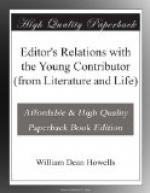It will not do to write for the editor alone; the wise editor understands this, and averts his countenance from the contributor who writes at him; but if he feels that the contributor conceives the situation, and will conform to the conditions which his periodical has invented for itself, and will transgress none of its unwritten laws; if he perceives that he has put artistic conscience in every general and detail, and though he has not done the best, has done the best that he can do, he will begin to liberate him from every trammel except those he must wear himself, and will be only too glad to leave him free. He understands, if he is at all fit for his place, that a writer can do well only what he likes to do, and his wish is to leave him to himself as soon as possible.
V.
In my own case, I noticed that the contributors who could be best left to themselves were those who were most amenable to suggestion and even correction, who took the blue pencil with a smile, and bowed gladly to the rod of the proof-reader. Those who were on the alert for offence, who resented a marginal note as a slight, and bumptiously demanded that their work should be printed just as they had written it, were commonly not much more desired by the reader than by the editor.
Of course the contributor naturally feels that the public is the test of his excellence, but he must not forget that the editor is the beginning of the public; and I believe he is a faithfuller and kinder critic than the writer will ever find again.
Since my time there is a new tradition of editing, which I do not think so favorable to the young contributor as the old. Formerly the magazines were made up of volunteer contributions in much greater measure than they are now. At present most of the material is invited and even engaged; it is arranged for a long while beforehand, and the space that can be given to the aspirant, the unknown good, the potential excellence, grows constantly less and less.
A great deal can be said for either tradition; perhaps some editor will yet imagine a return to the earlier method. In the mean time we must deal with the thing that is, and submit to it until it is changed. The moral to the young contributor is to be better than ever, to leave nothing undone that shall enhance his small chances of acceptance. If he takes care to be so good that the editor must accept him in spite of all the pressure upon his pages, he will not only be serving-himself best, but may be helping the editor to a conception of his duty that shall be more hospitable to all other young contributors. As it is, however, it must be owned that their hope of acceptance is very, very small, and they will do well to make sure that they love literature so much that they can suffer long and often repeated disappointment in its cause.
The love of it is the great and only test of fitness for it. It is really inconceivable how any one should attempt it without this, but apparently a great many do. It is evident to every editor that a vast number of those who write the things he looks at so faithfully, and reads more or less, have no artistic motive.




